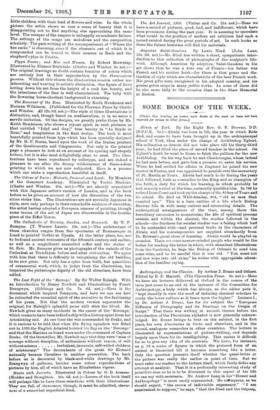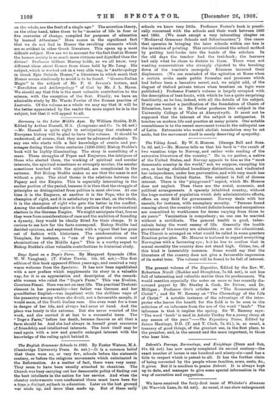Anthropology and the Classics. By Arthur j. Evans and Others.
Edited by R. R. Marrett. (The Clarendon Press. 60. net.)—Here we have six lectures delivered at Oxford in the course of the term just come to an end at the instance of the Committee for Anthropology, a body which has always, as the editor puts it, "kept steadily in view the need of inducing classical scholars to study the lower culture as it bears upon the higher." Lecture I., by Dr. Arthur J, EV8113, has for its subject the "European Diffusion of Pictography and its Bearings on the Origin of Script." That there was writing in ancient Greece before the introduction of the Phoenician alphabet is now generally acknow- ledged. Dr. Evans brings to bear on the subject, in the first place, his own discoveries in Crete and elsewhere, and in the second, analogous researches in other countries. The lecture is illustrated by representations of picture-writing, and depends largely upon them for its intelligibility. This makes it difilcukt for us to give any idea of its contents. We have, for instance, on p. 13 a series of figures in which the pictured form of an animal is linearised till it becomes something like a letter. Only the question presents itself whether the quasi-letter or the picture was really the earlier in point of time. But wa must refer our readers to the lecture itself, which fairly defies any attempt at analysis. That it is a profoundly interesting study of primitive man as he is to be discerned in this aspect of his life we can say with assurance. Mr. Andrew Lang in his "Homer and Anthropology" is more easily represented. He ciftmpwas, as, we should expect, "the crown of indivisible supremacy." "1 am constrained to suppose," he says, "that the Iliad and the Odyney, on the whole, are the fruit of a single age." The accretion theory, on the other hand, takes them to be "mosaics of life in four or five centuries of change, compiled for purposes of education by learned Athenians." Here comes in the significant fact that we do not find in Homer the revolting elements which are so evident in other Greek literature. This opens up a most difficult subject. How are wo to account for the fact that in Homer the human society is so much more virtuous and dignified than the divine? Professor Gilbert Murray holds, as we all know, very different ideas about Homer from those held by Mr. Lang. His subject, which is worked out in a very able way, is "Anthropology in Greek Epic Outside Homer," a literature in which much that Homer seems studiously to avoid is to be found. " Graeco-Italian Magic" is the subject of Mr. F. G. Jevons's lecture, and " Herodotus and Anthropology" of that by Mr. J. L. Myres. We should say that this is the most valuable contribution to the science, with the exception of the first. Finally, we have an admirable study by Mr. Warde Fowler of the Roman practice of Lustratio. Of the volume as a whole we may say that it will be the better appreciated by the reader the more expert he is in the subject, but that it will appeal to all.







































 Previous page
Previous page